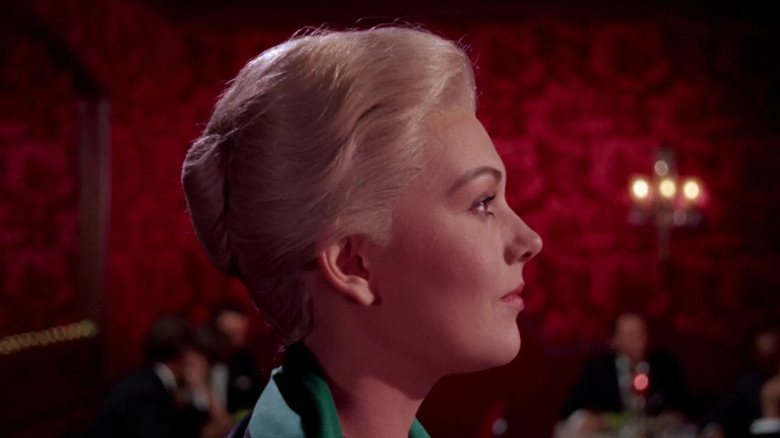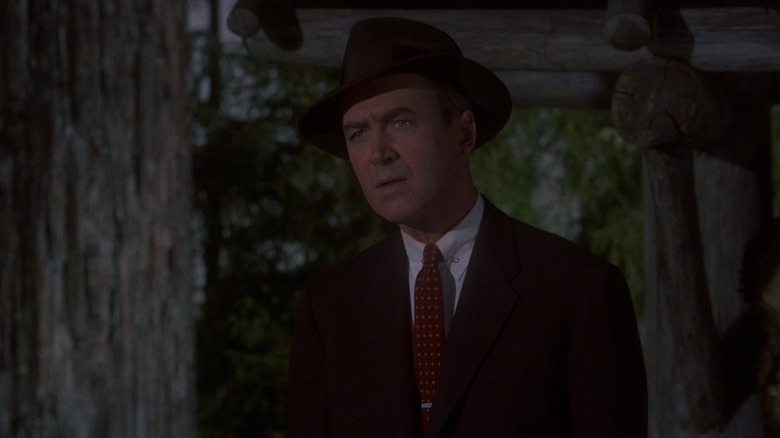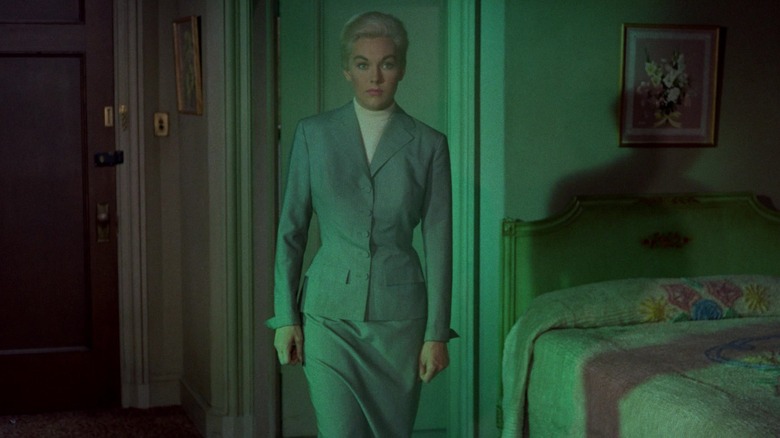Why You Should Save Watching Alfred Hitchcock's Best Movie For Last
Every 10 years since 1952, Sight & Sound Magazine has conducted a poll of notable critics and filmmakers to surmise the best movies of all time. From 1952 through 2002, Orson Welles' unassailable classic "Citizen Kane" was polled at #1. 2012, however, finally saw an upset, with "Citizen Kane" falling to #2 and Alfred Hitchcock's "Vertigo" supplanting it. After 50 years, there was a new "Best Movie Ever Made." This was something of a surprise, as "Vertigo" wasn't always considered a top-10-level classic by the Sight & Sound pollsters. Indeed, Hitchcock's psychosexual thriller didn't even crack the upper echelons of the poll until 1992, when it debuted at #4.
I'm old enough to remember the collective groans emitted in 2012. Sure, cineastes the world over love "Vertigo," but ... why that one? "Vertigo" is a notoriously oblique film, suffused with an indistinct, dreamlike tone. It has weird themes of romantic and sexual obsession, as well as even weirder underpinnings of sexual dominance that emit a whiff of BDSM. "Vertigo" is also a soap opera thriller wherein the golden-boy hero is revealed to be an aggressive, off-putting, controlling deviant by the end. Fans of David Lynch's "Blue Velvet" will get a kick out of "Vertigo."
At the same time, "Vertigo" is very strangely paced, with its thriller elements coming to an end about halfway through the movie, only to be supplanted by a new kind of obsession drama. It's oblique. Difficult. Off-putting. Ask any film student or Hitchcock fan, and they will likely tell you they prefer more crowd-pleasing movies like "Psycho," "Rear Window," "Notorious," "North by Northwest," "The Birds," "Rope," or "Strangers on a Train" over "Vertigo."
And yet, "Vertigo" is often listed as the best Hitchcock film. Why is that?
The reason is that "Vertigo" rests at the end of one's cinematic journey. It's so complex and mired in Hitchcock's personal interests that it only emerges as a classic once you've seen a lot of other movies, Hitchcock's included.
Watch Vertigo last
If you have a syllabus of great films, make sure that "Vertigo" is at the very bottom. As a mainstream thriller, "Vertigo" barely functions. The above-mentioned pacing is certainly an issue, with Hitchcock often pushing his film into a ghostly headspace. Many passages in "Vertigo" more closely resemble slow-moving, low-budget horror movies like "Carnival of Souls" than exciting psychological thrillers like "Psycho" or "Rear Window." Many Hitchcock neophytes have likely had the experience of watching something more exciting like "The Birds" or "North by Northwest," and then jumping straight to "Vertigo," only to discover an alienating, bizarre experience.
To briefly cover the story, "Vertigo" is about Scottie (James Stewart), a former police detective who is hired by an old friend named Gavin (Tom Helmore) to follow his wife Madeleine (Kim Novak). Madeleine, you see, has become obsessed with a dead woman named Carlotta Valdes and is behaving as if she may be possessed by Carlotta's ghost. Madeleine regularly looks at an old portrait of Carlotta and even wears her hair the same way. As Scottie draws closer, however, he finds himself becoming romantically attracted to Madeleine, despite her wistful longings toward death. Halfway through the movie, though, Madeleine dies by jumping from a tall bell tower. Scottie is unable to stop her because of his acrophobia, a condition he acquired while working as a cop.
The back half of "Vertigo" shifts gears. One day, by happenstance, the depressed Scottie meets a red-haired woman named Judy (also Novak). He begins stalking her, thinking she may be a reincarnation of Madeleine that he can manipulate. Judy eventually agrees to date him, but Scottie only becomes more controlling and wrathful, altering her looks to make her more like Madeleine. There are further twists beyond.
As mentioned, it's an odd movie. "Vertigo" doesn't really have a handy "elevator pitch," and it revolves around sad, confused people. Having to watch the ordinarily wholesome Stewart become the 1950s equivalent of a sexual dom is certainly unexpected, to say the least.
Vertigo requires a lot of pretense
Perhaps above all else, "Vertigo" requires a lot of pretense. It is, in the classic sense of the word, pretentious. A film professor will happily walk you through the movie's cinematic craft and point out why what Hitchcock did was daring, unique, and brilliant. Hitchcock's use of color in "Vertigo" is notable, with reds standing out as open wounds of passion and greens standing in for lust. Hitchcock famously dressed Novak in a gray suit, something that blonde women didn't typically do at the time. She was meant to look striking but also a little "off," as if she was a product of Scottie's imagination. Later in the film, when Scottie forces the unwitting Judy to dress like the dead Madeline, she is bathed in green light.
One might also want to pay attention to the framing. Everything notable in "Vertigo" is placed in the dead center of the frame. The cinematographic "rule of thirds" is often ignored. The effect is strange. Audiences are used to off-center images. "Vertigo" forces us to look right in the middle, as if staring into a whirlpool. This sort of thing could only be recognized as brilliant after one has developed a basic knowledge of cinematography.
Also, "Vertigo" plays directly to Hitchcock's fetishes, as he had been laying them forth for decades. His female leads tended to be icy, inscrutable blondes dressed in tight, armor-like dresses. Hitchcock certainly had a type, and his need to dress them a certain way for his movies bordered on the unsavory. "Vertigo" was not just Hitchcock indulging in his fantasies, but interrogating himself. How is the director any different from the angry, horny Scottie, insisting that a young woman turn into his own ultimate fetish object? One can only really see this about "Vertigo" after one has a working familiarity with Hitchcock's oeuvre or perhaps even Hitchcock's off-screen personality.
Once you've seen enough Hitchcock films, "Vertigo" begins to cohere as a work of brilliance. But it's very, very important that you watch it last.


